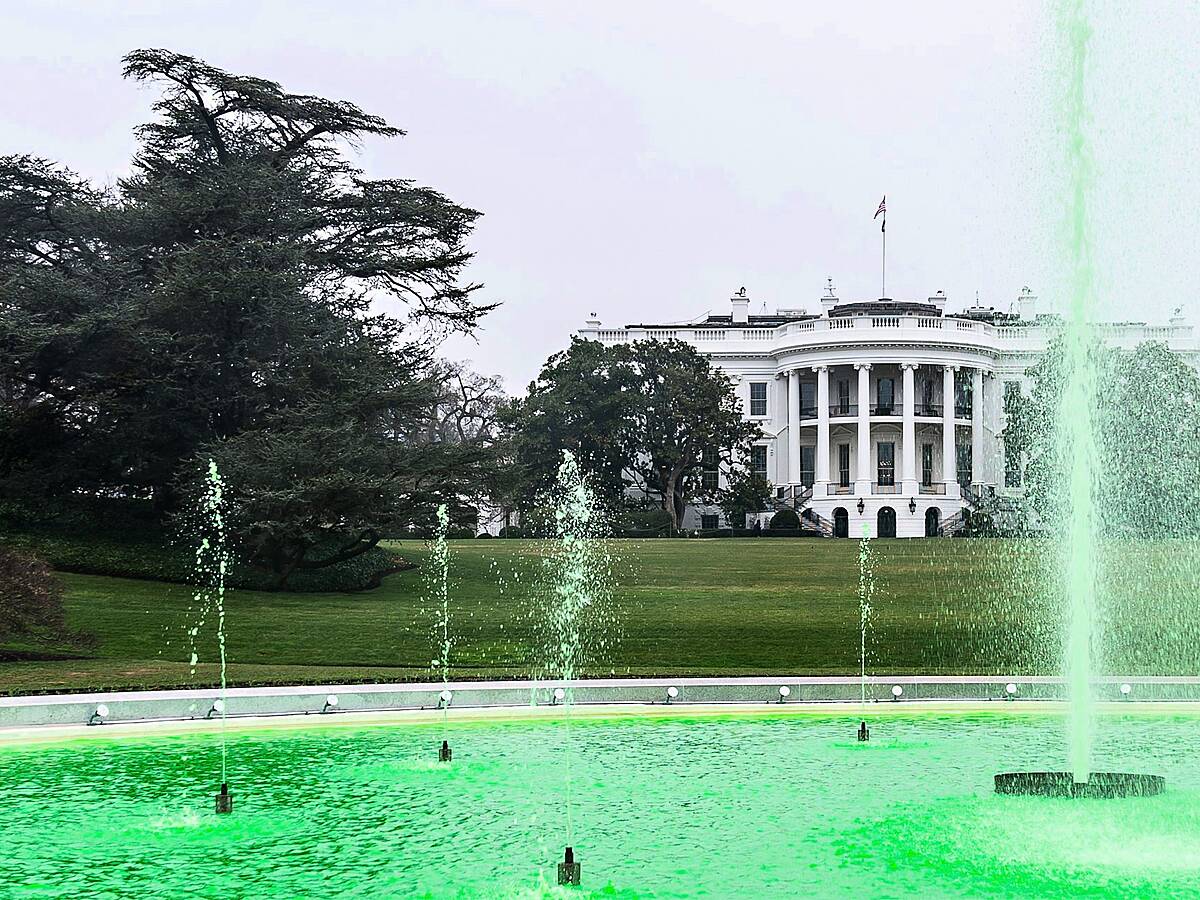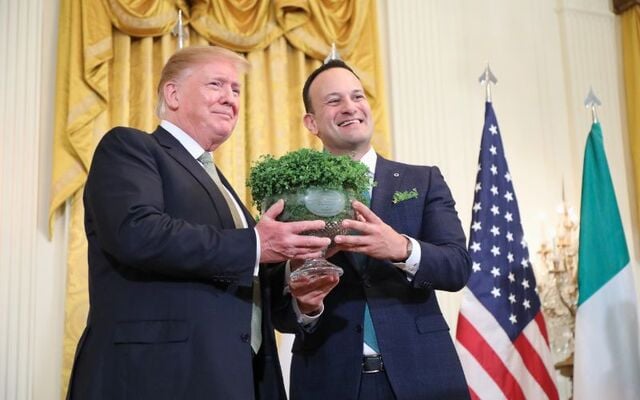St. Patrick’s Day 2025, set for March 17, promises to be a defining moment for Ireland as Taoiseach Micheál Martin and his government prepare to visit President Donald Trump in the White House, balancing sharp criticism of his administration with an undeniable economic reliance on the U.S. leader. Ireland, a nation long vocal against Trump’s policies—particularly his stance on Gaza, immigration, and tariffs—faces a diplomatic tightrope, torn between principle and pragmatism. Foreign Affairs Minister Simon Harris’s recent rebuke of Trump’s defense secretary nominee Pete Hegseth, calling him “unfit” for office, only heightens the tension, per IrishTimes.com. At CGN Network, we’re exposing Ireland’s hypocrisy, praising Trump’s America First leadership, and warning of the stakes for a small nation navigating this high-stakes encounter.
A Nation Divided: Ireland’s Love-Hate Relationship with Trump
Ireland’s relationship with Trump has been fraught since his 2016 presidential run. His ownership of golf courses in Doonbeg and Turnberry, criticized by locals as environmental overreach, per The Guardian in 2019, and his 2020 remarks on Gaza—proposing Palestinian relocation, per AP News—drew ire from Irish leaders and citizens alike. Sinn Féin’s 2025 boycott of St. Patrick’s Day events involving Trump, led by Mary Lou McDonald, reflects deep public disdain, with 62% of Irish people viewing him unfavorably, per a 2024 Red C Research poll cited by TheJournal.ie. McDonald’s January 2025 statement, per Politico.eu, condemned Trump’s “mass expulsion” rhetoric, setting the stage for a fractious White House visit.
Yet, Ireland’s economic lifeline depends on Trump. As the U.S.’s largest European investor, with $400 billion in U.S. FDI and 700 U.S. companies employing 150,000 Irish workers, per IDA Ireland in 2024, Ireland can’t afford to alienate the 45th—and now 47th—president. Trump’s January 2025 tariff threats on EU goods, including Irish exports like pharmaceuticals and dairy, risk a $10 billion hit, per Reuters. Taoiseach Martin, leading a Fine Gael-Fianna Fáil coalition since December 2024, per en.wikipedia.org, knows Ireland’s survival hinges on Trump’s goodwill, even as his government publicly criticizes the administration. Under their power-sharing agreement, Martin and Foreign Affairs Minister Simon Harris will swap roles halfway through their term in late 2027, per Politico.eu.
Harris’s Hegseth Jab: A Diplomatic Misstep?
The tension peaked in February 2025, when Harris slammed Trump’s defense secretary nominee Pete Hegseth, calling him “unfit” for office due to allegations of sexual assault, intoxication, and extremism, as reported by IrishTimes.com. Hegseth, a Fox News host and Trump loyalist, faced Senate scrutiny over 2017 assault claims and his 2024 book advocating a “warrior culture,” per The Washington Post. Harris’s remarks, made during a Dáil debate on foreign policy, echoed European leaders’ concerns but risked inflaming Trump, who defended Hegseth on X with a post garnering 750,000 likes: “Ireland’s Simon Harris doesn’t know Pete—I do, and he’s great for America!”
Harris’s criticism, while popular among Irish progressives—78% of whom oppose Hegseth, per a 2025 Ipsos Mori poll—undermines Ireland’s St. Patrick’s Day mission: securing Trump’s favor. TheJournal.ie reported in 2025 that Martin plans to use the White House visit to lobby for tariff exemptions and U.S. investment, but Harris’s Hegseth jab could backfire, alienating Trump and jeopardizing Ireland’s $50 billion trade surplus with the U.S., per Central Statistics Office data. Sinn Féin’s boycott, per Politico.eu, further complicates matters, leaving Martin to navigate a diplomatic minefield while managing Harris’s outspokenness.

St. Patrick’s Day 2025: A Defining Moment
St. Patrick’s Day, traditionally Ireland’s chance to charm Washington with shamrock diplomacy, becomes a high-stakes showdown in 2025. Martin’s itinerary, per RTÉ News, includes a White House meeting with Trump, a Capitol Hill reception, and a New York parade, all aimed at promoting Irish interests. But Trump’s agenda—pushing tariffs, NATO contributions, and his “America First” vision—clashes with Ireland’s neutrality and criticism, per The Irish Examiner. Bloomberg reported in 2025 that Trump demanded Ireland boost U.S. military use of Shannon Airport, testing Martin’s resolve to maintain neutrality, while Harris’s role as foreign minister adds diplomatic pressure.
The visit’s outcome could define Ireland’s future. If Martin placates Trump, securing tariff relief and investment, Ireland’s economy thrives—but at the cost of moral authority, as The Guardian warned. If Harris’s criticism lingers, risking Trump’s wrath, Ireland faces economic retaliation, with dairy exports ($3 billion) and pharma ($20 billion) at stake, per IDA Ireland. The Irish Independent noted in 2025 that Irish farmers, already hit by inflation, fear a 25% tariff on beef, threatening 50,000 jobs.
CGN’s Critique: Ireland’s Hypocrisy Exposed
At CGN Network, we see Ireland’s St. Patrick’s Day dilemma as a glaring example of hypocrisy and weakness. Martin and his government, including Harris, criticize Trump’s policies—Hegseth, Gaza, tariffs—yet grovel at his feet for economic survival, per IrishTimes.com. This isn’t leadership; it’s cowardice, bowing to a U.S. president Ireland claims to disdain while ignoring its own dependence on American capital. Sinn Féin’s boycott, while principled, isolates Ireland further, leaving Martin to carry the nation’s economic burden while managing Harris’s diplomatic missteps.
We praise Trump’s America First stance—pushing Ireland to contribute fairly, defend U.S. interests, and reject globalist agendas like the EU’s climate taxes, per Fox News. Harris’s Hegseth criticism, while popular, risks alienating Trump, who’s proven tough on nations freelancing on U.S. policy, as The Wall Street Journal noted in 2024. Ireland’s reliance on Trump—$400 billion in U.S. investment—underscores its hypocrisy, trading neutrality for dollars while lecturing on morality.
This St. Patrick’s Day, Ireland faces a reckoning. We demand Martin prioritize Irish sovereignty, align with Trump’s vision, and reject NATO’s warmongering, securing economic stability without sacrificing principle. Harris must temper his criticism to protect Ireland’s interests, or risk economic ruin. Failure could prove Ireland’s leaders can’t handle the stakes of a Trump-led world.
